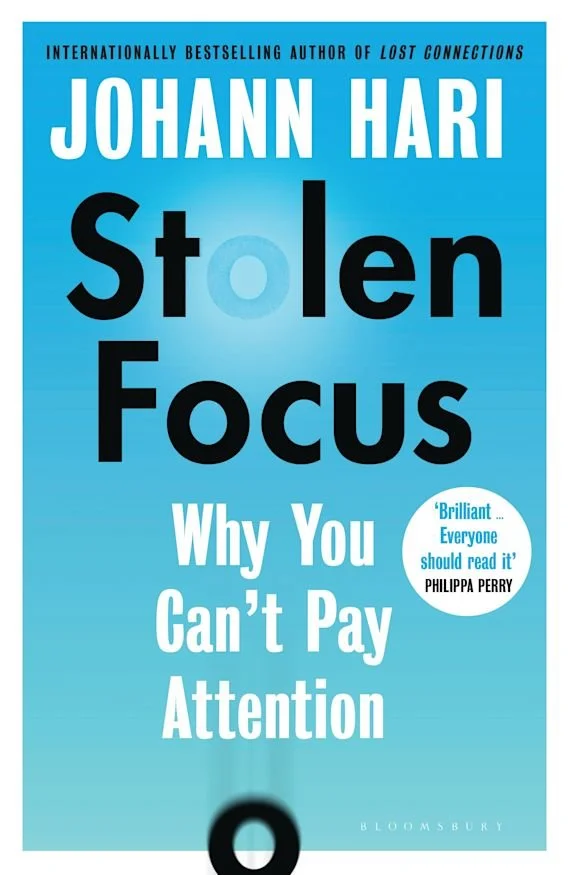Review: Stolen Focus, Johann Hari
British-Swiss author Johann Hari specialises in books that take deep dives into wicked problems – for example, the war on drugs (Chasing The Scream) and depression (Lost Connections).
Stolen Focus is a sustained piece of reflective long-form journalism investigating the hypothesis that humans’ attention spans are decreasing, using the author’s own experiences in attempting to regain his own attention span to turn the investigation from research project into personal quest in which both the reader and writer have a vital stake.
Hari introduces himself as a hopeless workaholic who sleeps little and consumes as much media as possible, and goes on a self-imposed digital detox to a small rural community, device-free, and slowly regains his attention and ability to slow down. He then charts his return to normal life and writing this book, only to greet the start of the coronavirus pandemic, which mounts the biggest possible challenge to his fledgling recovery.
Laced though this highly readable narrative is his analysis of his research and interviews with numerous world authorities on the causes of attention breakdown and their relative potential importance: including speed, filtering and task-switching; the crippling of “flow states” as illuminated in the work of Mihaly Csikszentmihalyi; the rise of physical and mental exhaustion; the collapse of sustained reading; the disruption of mind-wandering; the rise of tracking and manipulating technology; the rise of cruel optimism; the surge in stress; deteriorating diets and rising pollution; the rise of ADHD; and the confinement of children.
He explores their structural foundations, particularly with regard to technology and economic forces, and potential solutions, including campaigning for the banning of surveillance capitalism; changing tech companies’ financial incentives; public ownership of social media as a public utility and the rolling back of its attention-sapping features; government regulation of the business model; the universal basic income; the four-day work week; legally enacting and enforcing the right to disconnect, as done to some degree in France; and recognition of the importance of unsupervised and undirected play for children.
He concludes with a discussion on the role of activism in effecting such solutions, describing what such an “attention rebellion” might look like, and saying he believes the climate and attention fights are intertwined – that humans will need their attention, their ability to achieve sustained focus, if they are to work successfully together on solutions to save the world.
More than 10 years ago in his previous career as a columnist, Hari had a dramatic fall from grace in committing some cardinal journalistic sins: fudging the sources of quotes, among other things. In his subsequent self-reinvention as an author he now goes the extra mile to ensure people can trust his work and provide transparency, including disclosing at length the thought processes he went through in assigning weight to certain interview subjects’ opinions, before stating his various cases and conclusions. He also provides full recordings of all his interviews, which are available on his website, and points this out wherever he is discussing a particularly controversial subject, such as big tech, or ADHD. The result is a refreshingly frank and scholarly tone, rather than a didactic one, giving the reader a sense of feeling their way forward alongside him.
This is not a self-help book. This is a society-help book. It takes the responsibility for societal problems off the self – the individual – and places it on the larger forces at play, complete with discussion of topics such as “cruel optimism”, that is, promotion of the idea that problems such as climate change, obesity and phone addiction are the fault of people’s individual weakness, and solvable with easy hacks. This book takes the fight to the corporations that got us into this mess, and begins to ask us what we are going to do about the bigger picture. Yes, we can turn off our push notifications … but our roles, and our responsibilities, do not end there.
This book is entertaining and page-turning, without a dull moment and full of fascinating factoids, a lovely example of science communication at its best, and the subject has only got more urgent since its publication in 2022.
Those who like the work of Kate Raworth, Sarah Wilson or Malcolm Gladwell will love this.
But this story and topic transcends special interests. It is one of the most important and most gripping books I have read this year and I urge anyone with a pulse to read it too.
Want to get notified of my next post? Subscribe.
